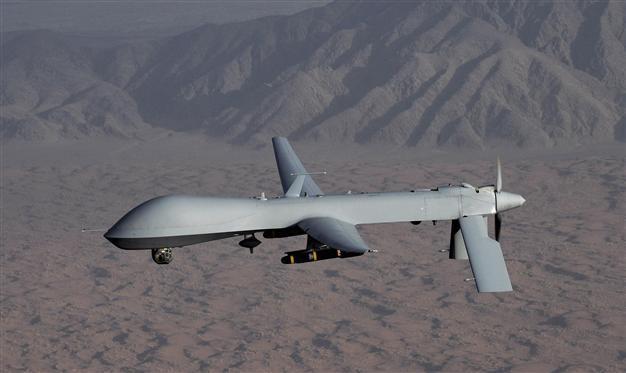Drone sales to Gulf countries boom amid instability
ABU DHABI - Reuters

REUTERS Photo
Global demand for drone aircraft is especially strong in Gulf Arab states that are worried about regional instability, industry executives said Feb. 18, as a big U.S. manufacturer unveiled the first sale of an unarmed Predator to the Middle East.Controversy over the legality of attacks by missile-firing drones will not dampen the volatile region’s enthusiasm for the technology, in part because export curbs mean most equipment sold will be for use only in reconnaissance, experts say.
Sello Ntsihlele, executive manager for UAVs at Denel Dynamics, a division of state-owned Denel, which is South Africa’s biggest maker of defense equipment, told Reuters this was “the best time” for unmanned aerial vehicle (UAV) sales.
“Demand is growing fast in developing countries, in the Middle East, the Far East and Africa. The Gulf is critical in all this,” he said on the sidelines of the biennial International Defense Exhibition and Conference (IDEX) in Abu Dhabi, capital of the United Arab Emirates (UAE).
“I can’t be specific but all countries in the Arabian Gulf are talking to us,” he said, adding that Denel’s UAV sales had risen around 20 percent in the last four years, driven mostly by the Middle East. The company had received up to double the number of inquiries from prospective clients than at the same conference two years ago, Ntsihlele said.
At IDEX, the United Arab Emirates announced a deal to buy an unspecified number of Predator drones from the privately-owned U.S. firm General Atomics in a deal worth $196.57 million.
Frank Pace, president at General Atomics Aeronautical, said his firm’s sales had risen by about 120 percent over the last five years, though until now it had not been able to sell to the Middle East due to tight export restrictions.
The UAE and Saudi Arabia are among several states, according to diplomatic cables released by WikiLeaks, that have asked U.S. officials to buy armed drones but which have been rebuffed. Washington says its commitments to the Missile Technology Control Regime (MTCR), a non-binding international agreement designed to limit the spread of long-range precision weaponry, restrict drone exports.
Thomas Kelly, principal deputy assistant secretary at the U.S. State Department’s Bureau of Political-Military Affairs, told reporters at IDEX that “caution” was Washington’s point of departure on drone sales. “We’re not pushing armed systems right now to other countries. We understand there’s a lot of interest in UAVs internationally ... [but] in terms of armed UAVs I think the administration is going to take its time to make sure that we have a policy that we’re comfortable with.”
Pace said he hoped the company would get approval to sell to more countries, especially in the Middle Eastern market, where he saw great potential. “We are talking to all of the Gulf [Arab] countries,” he said. Sales are growing in the Middle East because having developed surveillance systems is fast becoming a requirement for all states, said Theodore Karasik, director of research at the Institute for Near East and Gulf Military Analysis.
“The region is still unstable, there are state actors and non-state actors that want to cause trouble and being able to keep tabs on what’s happening is very important.”
The oil-rich Gulf Arab states are alarmed at the civil war in Syria and want to ensure that popular uprisings in North Africa do not stir dissent at home. The intentions of regional rival Iran, locked in a dispute with major powers over its nuclear program, are a perennial concern for the Gulf region’s hereditary ruling families.
Controversy over the legality of drone strikes would have little impact on global appetite for UAVs, Karasik said.
The U.S. government has dramatically increased its use of drone aircraft abroad in recent years to target al-Qaeda figures in far-flung places from Pakistan to Yemen. Britain and Israel have also carried out such attacks, and dozens more states are believed to possess the technology. Targeted killings carried out by remotely piloted unmanned aircraft are controversial because of the risks to nearby civilians and because of their increasing frequency.
















